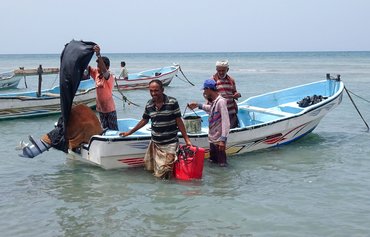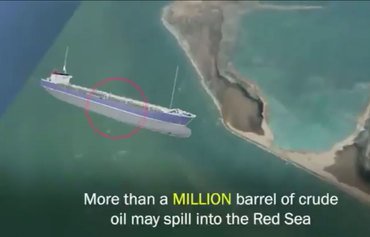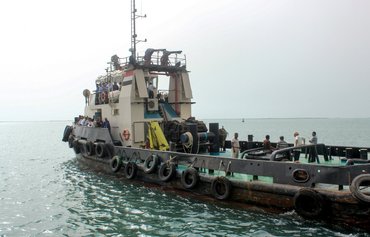RIYADH -- Saudi Arabia on Sunday (June 12) pledged $10 million to help prevent an aging Yemeni oil tanker from unleashing a potentially catastrophic spill in the Red Sea bordering its waters.
The decaying 45-year-old oil tanker known as the FSO Safer, long used as a floating storage platform and now abandoned off the Houthi-held Yemeni port of al-Hodeidah, has not been serviced since Yemen was plunged into war.
The tanker, which lies some 150km south of the border with Saudi Arabia, is in "imminent" danger of breaking up, the United Nations (UN) warned last month.
The Safer contains four times the amount of oil that was spilled by the 1989 Exxon Valdez disaster, one of the world's worst ecological catastrophes, according to the UN.
![A satellite image from Maxar Technologies shows the FSO Safer oil tanker on June 19, 2020. [Maxar Technologies/AFP/File]](/cnmi_am/images/2022/06/13/35754-safer-tanker-600_384.jpg)
A satellite image from Maxar Technologies shows the FSO Safer oil tanker on June 19, 2020. [Maxar Technologies/AFP/File]
Last week, environmental campaign group Greenpeace urged the Arab League to drum up funds for an operation that would transfer the Safer's 1.1 million barrels of oil to a different vessel.
A UN pledging conference last month fell far short of its $80 million target, bringing in just $33 million.
The cost of the operation is a pittance compared to the estimated $20 billion it would cost to clean up a spill, warn environmentalists.
The UN has said an oil spill could destroy ecosystems, shut down the fishing industry and close the lifeline al-Hodeidah port for six months.
The operation needs to be completed by the end of September to avoid "turbulent winds" that pick up later in the year, it has said.
The consequences would be devastating not only to Yemen but to regional countries such as Saudi Arabia and all the way to the Suez Canal and Djibouti, Yemeni Deputy Minister of Justice Faisal al-Majeedi said a year ago.
"Reports show that in case of a leak, Yemeni fishermen and the maritime ecosystem will suffer the most as it will affect 90 species of fish and will destroy coral reefs," he said.
Riyadh will donate $10 million to the effort through the King Salman Humanitarian Aid and Relief Centre (KSRelief), the Saudi Press Agency reported Sunday.
"The kingdom calls on the UN to quickly take the necessary measures to ensure the prevention of oil leakage," the SPA said.
It "also calls on the international community to contribute urgently to support this initiative and prevent a serious environmental disaster".
To mark World Ocean Day, the US Department of State on June 8 announced it is working with Congress to provide $10 million in support of the UN plan to address the imminent threat to the Red Sea ecosystem from the FSO Safer.
Houthis have delayed the process
The Safer's potential for causing an environmental disaster has been understood for years, but progress towards a solution has been painfully slow, with many accusing the Iran-backed Houthis of delaying and obstructing the process.
In March this year, the Houthis finally agreed on a "framework for co-operation" with the UN on the issue of the tanker, but the move was a long time coming, critics noted.
Yemeni officials have said the Houthis' initial reluctance to allow UN inspectors onboard, despite urgent appeals, indicated they were using the situation as a political bargaining chip.
The reclamation and potential sale of the oil on board the tanker were at the root of the delays, with some parties expressing concern that the Houthis would use any proceeds from the sale to fund their war effort.
Yemeni activists in August 2020 launched an urgent appeal to allow UN teams immediate access to the Safer, asking that it be dissociated from political considerations and approached as a purely humanitarian crisis.
In a statement, the more than 100 signatories to the appeal -- journalists, activists and public figures -- said the international community and global environmental organisations must work to prevent a disaster in the Red Sea.
If the Houthis "continue to delay tackling the crisis, the international community should take responsibility for that", they said.

![A photo of a leak in the cooling pipes on the FSO Safer, posted on Twitter on July 8, 2020, shows the extent of the corrosion on the vessel. [I.R. Consilium/Twitter]](/cnmi_am/images/2022/06/13/35756-safer-corroding-pipes-600_384.jpg)






